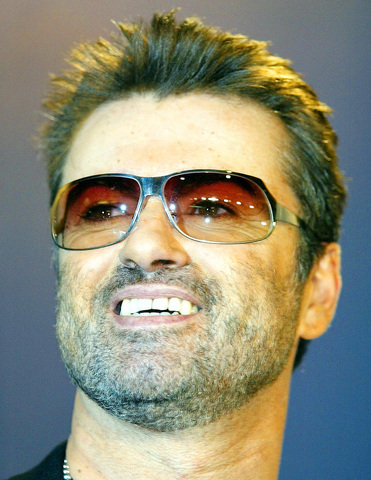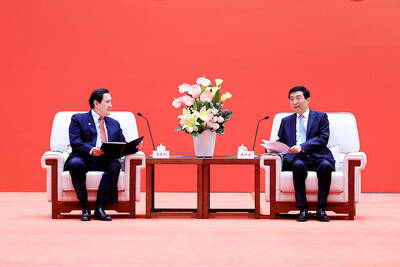George Michael is counting the number of ways he has tried to destroy his career. There's the time he refused to promote his own work, and went to war against Sony, whom he
labelled a slave-master.
The years he refused to make records. The years he couldn't make records. The years locked away from the public, mired in despair and depression. Then there's sex -- the time he outed himself in a Los Angeles public toilet after being caught cruising by the police. And, of course, there is politics -- he made an anti Bush-Blair song, Shoot the Dog, that won him a whole new wave of enemies.

PHOTO: AP
And still, somehow, he is huge. Now he has made a documentary,A Different Story. Typical Michael, he bought the unfinished film off the production company when he decided they were making a mess of it and that he could tell it better. It's that strangest of beasts -- a warts'n'all hagiography. Sure, he emerges a hero, but not without us knowing exactly what his enemies (and friends) can't stand about him.
He says he has been so remiss over the years, treated his fans so poorly, that the least he could do was explain what he's been up to.
The film, though heavy, isn't half as heavy as the story he tells me over the next few hours.
We are sitting upstairs in his management office just across the road from his north London house. He looks like you'd expect him to -- dark clothes, designer shades, designer stubble. He's 42 now, his skin is slightly pinched, the stubble beginning to grey, but he's in good nick.
"I'd say my recovery really started two years ago. So that's 12 years of depression and fear, and lots of other shit. I swear to God it was like I had a curse on me. I couldn't believe how much God was piling on at once. There was so much death around me, I can't tell you," he said.
In A Different Story, he asks his former Wham! partner Andrew Ridgeley whose life he would have rather had -- his own or Michael's -- as if there could only be one possible answer. It's rather haunting when you realize that he means only an idiot would choose Michael's life -- after all, to the public, Ridgeley is just the pretty boy who hung on to the coat-tails of the hugely talented Michael long enough to make a fortune and then disappeared.
I ask him why he would have rather had Ridgeley's life.
"Because he hasn't experienced loss. I wanted to say to him, `You don't understand, 12 years of my life disappeared into darkness.' Just because I managed to somehow throw a record out every once in a while to maintain a career ... " He trails off.
As a boy, George Kyriakos Panayiotou was both paralyzingly shy and desperate for fame. He was born in east Finchley in north London and his Greek father ran a restaurant with his English mother. He met Ridgeley at school, and they became friends -- Ridgeley's brash certainties complemented his more introverted talents. Michael says there was always a contradiction at the heart of himself and Wham! The band sold themselves on their sexual brio, but actually Michael was both confused and inexperienced.
Michael, who wrote virtually all the songs, soon emerged as the creative partner. He went solo in 1984, and with his first single (the classic ballad Careless Whisper) and first album, Faith, became the biggest singer-songwriter in the world.
In 1991, Michael met and fell in love with Brazilian Anselmo Feleppa. Shortly after they got together, Feleppa discovered he had AIDS. Michael spent the next four years nursing his boyfriend to his death.
Michael went into a depressive spiral. Perhaps it was inevitable, he says -- genetics. There was a terrible history of depression in the family.
"My poor old mum, she found both her father and her brother ... both stuck their head in gas ovens," he said.
He was told that his uncle killed himself the day Michael was born -- the subject of the song My Mother Had a Brother on his last album, Patience.
He went on a diet of Prozac and cannabis. The Prozac made his head even worse, he says.
"At first you're flying about, snapping at people one minute, really happy the next, and I made some disastrous business decisions," he said.
After a year he quit the Prozac and upped his intake of cannabis. At one point, he was smoking 25 joints a day, mostly potent skunk, and when he wasn't spliffing he was chainsmoking cigarettes. Today, he has cut down hugely, but when he occasionally loses his thread or forgets a question, he blames the cannabis.
At least his ability to write has not deserted him, he says with confidence. But the next second he admits that is his greatest fear, and there have been sustained periods when he couldn't write a thing.
In 1998, he was found masturbating in a public convenience by the Los Angeles police. Of all the terrible things he mentions that have happened, this is not one of them. He controlled the situation brilliantly, using it to come out with humor, astonishing dignity considering the circumstances and a massive hit record and video, Outside, that recreated the incident. It relaunched his stalling career. He has said so many times that it turned out to be a blessing.
Does he still go cruising?
"No. It's one thing to get caught cruising and make a joke of it and turn it around, it's another thing to get caught again and look stupid, isn't it? And anyway it's not any fun any more because I outed myself. That was the whole point," he said.
Why didn't he come out earlier? Initially, he says, he was going to come out when he was 19, but didn't because he was still unsure of his sexuality and was advised not to.
"I didn't actually realize I was till I was about 24," he said.
Then, he didn't do it because he knew his mum would be terrified that he'd contract AIDS. Finally, he says, by the time he was happy to, he despised the press so much that he wouldn't give them what they wanted.
"By the time I actually outed myself I had tried every way to let people know that I was OK with being gay, even the fuckin' handlebar moustache for a little bit," he said.
Having come out, he didn't conform to the polite, desexualized notion of gay. He told the media that he was living with his boyfriend Kenny Goss but they enjoyed an open relationship and he had a voracious sexual appetite.
Is he really that dirty?
"No. I'm just very regular. Haha! I feel I should have extreme tastes but I don't. I'm very much what gay people call vanilla, but I am filthy in that I want it a lot!" he said.
And, for the first time in years, he feels as if he's truly out of the woods. It's his current optimism, he says, that allows him to be so open about his past despair. He and Kenny are going to sign up to a civil partnership. He is writing songs once again, planning to tour, and looking forward to the future.

The canonical shot of an East Asian city is a night skyline studded with towering apartment and office buildings, bright with neon and plastic signage, a landscape of energy and modernity. Another classic image is the same city seen from above, in which identical apartment towers march across the city, spilling out over nearby geography, like stylized soldiers colonizing new territory in a board game. Densely populated dynamic conurbations of money, technological innovation and convenience, it is hard to see the cities of East Asia as what they truly are: necropolises. Why is this? The East Asian development model, with

Desperate dads meet in car parks to exchange packets; exhausted parents slip it into their kids’ drinks; families wait months for prescriptions buy it “off label.” But is it worth the risk? “The first time I gave him a gummy, I thought, ‘Oh my God, have I killed him?’ He just passed out in front of the TV. That never happens.” Jen remembers giving her son, David, six, melatonin to help him sleep. She got them from a friend, a pediatrician who gave them to her own child. “It was sort of hilarious. She had half a tub of gummies,

The wide-screen spectacle of Formula One gets a gleaming, rip-roaring workout in Joseph Kosinski’s F1, a fine-tuned machine of a movie that, in its most riveting racing scenes, approaches a kind of high-speed splendor. Kosinski, who last endeavored to put moviegoers in the seat of a fighter jet in Top Gun: Maverick, has moved to the open cockpits of Formula One with much the same affection, if not outright need, for speed. A lot of the same team is back. Jerry Bruckheimer produces. Ehren Kruger, a co-writer on Maverick, takes sole credit here. Hans Zimmer, a co-composer previously, supplies the thumping

There is an old British curse, “may you live in interesting times,” passed off as ancient Chinese wisdom to make it sound more exotic and profound. We are living in interesting times. From US President Donald Trump’s decision on American tariffs, to how the recalls will play out, to uncertainty about how events are evolving in China, we can do nothing more than wait with bated breath. At the cusp of potentially momentous change, it is a good time to take stock of the current state of Taiwan’s political parties. As things stand, all three major parties are struggling. For our examination of the